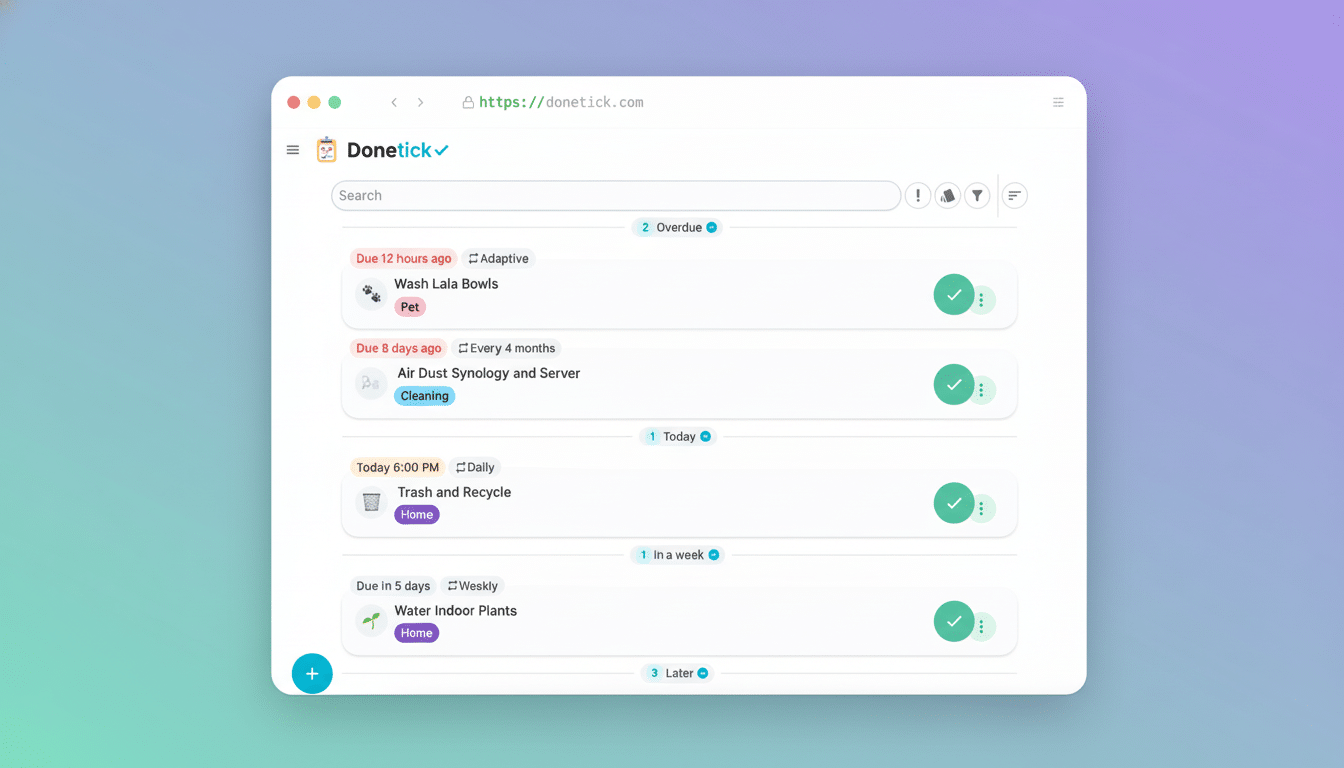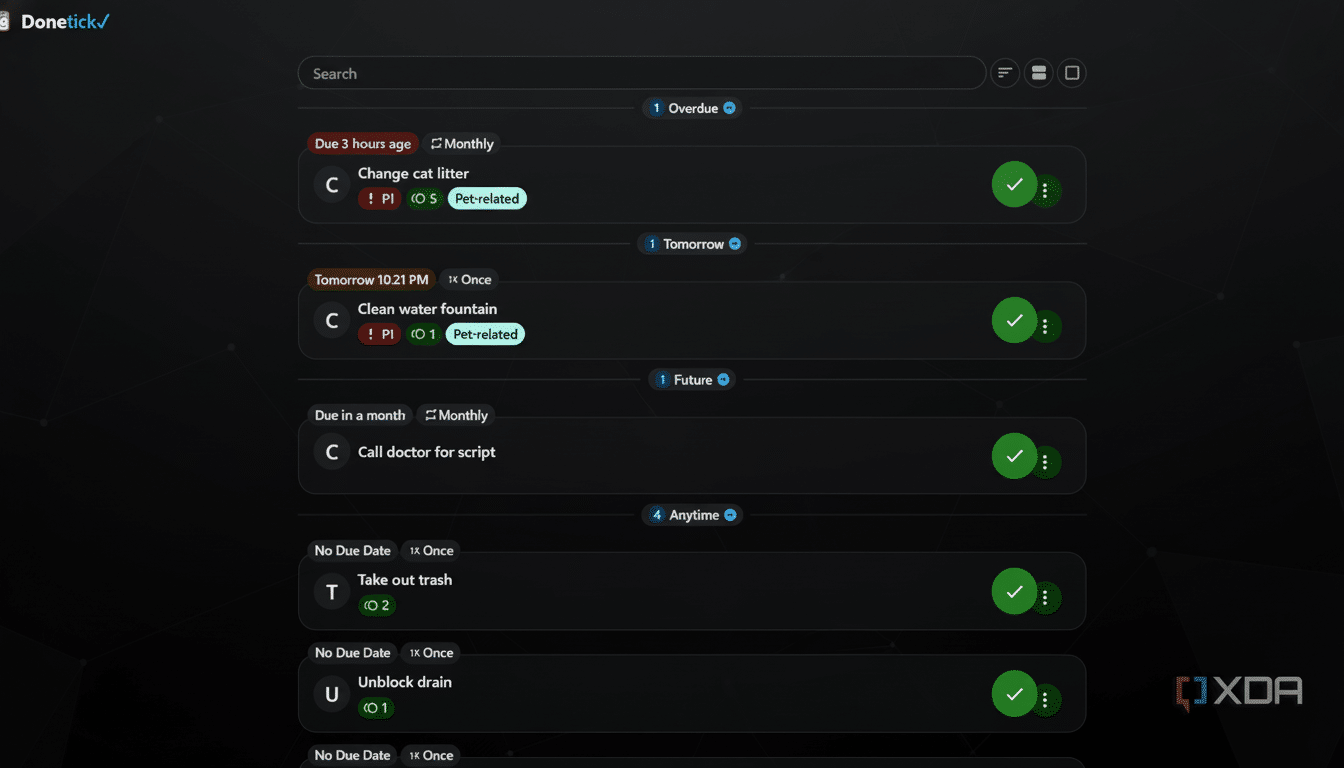When your phone stops feeling like a slot machine and starts behaving like a quiet assistant, life gets calmer. I’ve been testing a handful of under-the-radar apps that court practical wins — chores, meds, plants, stretching, subscriptions and cooking — without piling on the subscription fatigue. Some have optional upgrades, but their core features are available for free. Here are the six that ultimately stuck — and why they work in real life.
Donetick Turns Chores Into Auto-Pilot Mode
Household admin devours time, quickly — U.S. time-use data from the Bureau of Labor Statistics shows that chores and suchlike can silently chew up in excess of an hour a day. Donetick addresses that mental overhead with a pared-down to-do list focused on recurring chores like pet care, laundry, seasonal maintenance and the rest.
- Donetick Turns Chores Into Auto-Pilot Mode
- Pillo Keeps Tabs on Past Prescriptions and Doses
- Planta Makes Watering Schedules Make Sense
- Bend Tailors Light Stretching to Your Reality
- Subby Halts Recurring Payments from Creeping Up
- Paprika Organizes Your Cooking and Grocery Runs
- Why These Six Punch Above Their Weight in Daily Life

You can make tasks automatically reschedule based on when you actually finished them, as opposed to a static calendar date. That’s a lifesaver for erratic cadences, such as quarterly flea treatments or filter switches. It’s open-source with the ability to self-host for privacy if you prefer, and a hosted cloud tier if you don’t want to run your own server. The Android app skews toward a secure connection, but it also offers a lightweight web version if you need one.
Pillo Keeps Tabs on Past Prescriptions and Doses
Remembering to take a pill is one thing; remembering over time when you took it and how many milligrams, and what changed after seeing a doctor, is another. The World Health Organization finds that, on average, adherence to long‑term therapy (like daily-dose medications for diabetes) is at 50% in high‑income countries — which makes a great tracker important.
Pillo keeps a record of every dose, timestamp and note without drowning you in upsells. Alerts are flexible, stock counts prevent “oops, I’m out” moments and you can export a clean medication list for specialist visits. You can manually add a drug to the database, too. There’s an interaction checker feature in the works, but even without it, the app history view and symptom notes make it much easier to identify emerging patterns, and speak with clinicians about them confidently.
Planta Makes Watering Schedules Make Sense
Watering is less of an open-and-shut case than it may seem. The Royal Horticultural Society notes that requirements range widely depending on light levels, potting mix and time of year. Planta translates those variables into a simple plan: log a plant’s species, light exposure and location, and the app outputs — with watering times and dates! — reminders that actually suit your setup.
There’s a place to keep track of photos, health status and toxicity info overall so you can monitor progress and catch problems early. Advanced guidance and plant identification live behind a premium tier, but the free features ease the biggest pain point — keeping track of what needs water when — which is especially helpful if your collection waxes and wanes between thriving and “Yeah, I’ll get to it tomorrow.”
Bend Tailors Light Stretching to Your Reality
There are plenty of fitness apps that prioritize intensity above all else. Bend goes a more thoughtful route, focusing on stretching and mobility with routines that you can really customize. The American College of Sports Medicine recommends flexibility work a few days per week; Bend makes you do it by inquiring about problem areas, conditions and sensitivity before serving up a plan.

You can create routines that target zones such as neck tension or hip nerve irritation, and establish structures of varying time limits for tough days. There’s a paid tier, but the free mode is robust enough to set a sustainable nightly routine — one that helps hit movement goals without setting off flare-ups or fatigue.
Subby Halts Recurring Payments from Creeping Up
Recurring charges are slippery. C+R Research has consistently found people underestimate their monthly subscription spend by a large amount. Subby provides you with a simple but flexible ledger for tracking bills, subscriptions, and annual renewals so nothing falls through the cracks.
Enter items with categories, currencies, intervals and reminders; then mark each charge as paid or put it on hold when you take a break. It’s deliberately dumbed down, and that’s exactly what makes it work. “It’s a way of keeping not just your own month, but the bills at a full arm’s length in terms of visibility,” Anagnost Pizitz said, “and depending on when you put it into motion during the billing cycle, it can keep your budget from being punched so hard by rising costs elsewhere.” If you ever felt blindsided by one of those “tiny” fees that hit altogether and add up to something else entirely… this will keep both your month clear at a glance — and steady your budget when costs go walking up elsewhere.
Paprika Organizes Your Cooking and Grocery Runs
Meal planning cuts costs and waste — groups like ReFED and the U.S.D.A. have linked better planning to less food in the trash. Paprika reads recipes, but it does so in an uber‑helpful way: It formats your ingredients clean‑as‑a‑whistle (no fractions or “tsp”s), scales quantities and starts its built-in timers from steps, even keeping the screen alive so you don’t smudge your phone mid-stir.
The attention grabber is the grocery export. Pick and choose only what you’re missing and cart it off to a neat shopping list. There’s a free mode to get you started, and a one‑time unlock for unlimited storage (no subscription!) but even the basics can change the way you cook on a weeknight. If you’ve been bouncing back and forth between the salvos of bookmarks and random tabs, this is the calm in that storm.
Why These Six Punch Above Their Weight in Daily Life
None of these apps attempts to be all things. They address a single point of friction in life — tracking chores, remembering meds, watering plants, limbering up, catching renewals, cooking with purpose — and take this as an opportunity to do so with as little hubbub as possible. That’s the point. Small, boring wins compound fast.
If privacy is a primary concern, the option to self-host Donetick is appealing; digital rights organizations have long encouraged reducing third‑party data exposure whenever possible. And for the remainder, free tiers cover the basics and permit optional upgrades. The net result is a calmer phone — and by extension, brain.

